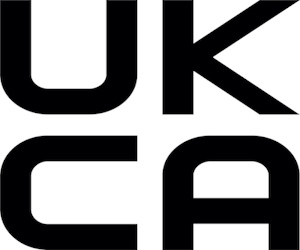UKCA Marking Information

Figure 1: UKCA
Note: The UK government intends to introduce legislation to extend recognition of goods that meet EU requirements, including the CE marking, indefinitely, beyond 31 December 2024 for many products. For the most up-to-date information, please refer to this website: https://www.gov.uk/guidance/using-the-ukca-marking
The UKCA marking stands for ‘United Kingdom Conformity Assessed’ marking. It is a new product certification for goods placed on the market in Great Britain after January 1, 2021. It is used to show compliance with UK product safety regulations and is required for certain products (like machinery, medical devices, gas appliances, etc.) that are placed on the market in Great Britain. The marking is used as a replacement for the CE marking, which is no longer accepted in Great Britain after the end of the Brexit transition period. Until December 31, 2024, both UKCA and CE markings will be recognized in the UK. It is used in conjunction with other markings, such as the BSi Kitemark, to indicate compliance with additional standards.
Table of contents
- Products covered by UKCA marking
- UKCA marking outside the UK
- How to use the UKCA marking
- Who can place the UKCA label
- UKCA guidelines
- When does UKCA come into force
- FAQs
Products covered by UKCA marking
UKCA marking is a conformity assessment mark used to indicate that a product has been evaluated and meets relevant safety and performance regulations in the United Kingdom (Great Britain). It replaced the CE marking, which had previously been used for products sold in the EU. The UKCA marking is mandatory for certain categories of products, such as electrical equipment, machinery, construction products, and more, and must be affixed to the product or its packaging. The purpose of this marking is to demonstrate that a product has been assessed for compliance with UKCA regulations and to provide assurance to consumers, regulators, and other stakeholders that the product is safe and fit for use.
The UKCA marking requirements may vary depending on the specific product and its intended use. It is important to consult the relevant regulations and standards to determine the specific requirements for each product. Products that need UKCA marking include, but are not limited to:
- Machinery: The UKCA marking is required for machinery that is manufactured or imported into Great Britain and placed on the market there. This includes a wide range of products, such as industrial machinery, agricultural machinery, and food processing machinery, among others.
- Medical devices: This includes a wide range of products, such as diagnostic equipment, surgical instruments, and implantable devices, among others.
- Personal protective equipment (PPE):PPE products that require UKCA marking include products such as safety helmets, gloves, and eye protection, among others.
- Pressure vessels: UKCA for pressure equipment is mandatory and includes products such as compressed air tanks, gas cylinders, and pressure cookers, among others.
- Gas appliances: This includes products such as gas boilers, gas cookers, and gas heaters, among others.
- Construction: Products such as building materials, insulation products, and structural components, among others.
- Radio and telecommunications terminal equipment: Products such as cell phones, radios, and Wi-Fi routers.
UKCA marking outside the UK
UKCA certification is only a legislative requirement for products sold within the United Kingdom. For instance, the it is not recognized in the European Union market. For the European Union (EU), CE (Conformité Européenne) certification is the conformity marking for products sold within the market. Additionally, other markets, such as the United States, don't recognize both the UKCA and CE markings on their products. Products in the United States only need to conform to applicable federal and state standards and regulations, like FCC for electronic products and Consumer Product Safety Improvement Act (CPSIA) for children's products. All of the above markings can be placed on the same product so long as it conforms to all the standards.
How to use the UKCA marking
For the most part, the UKCA marking is placed on either the product itself or the product's packaging. Currently, the rules applied when affixing CE markings have been adopted for the UKCA marking. However, the UK government intends to pass a regulation to prolong the duration of which the UKCA marking can be fixed on an accompanying document or a sticky label.
Who can place the UKCA label
The UKCA label can be placed by the manufacturer, importer, or authorized representative of the manufacturer located within the United Kingdom or the European Economic Area (EEA) who is responsible for ensuring that the product complies with the applicable requirements of UK law.
UKCA guidelines
There are certain requirements while placing the UKCA label:
- When adjusting the size and positioning of the label, the letters must remain proportional to the original UKCA image seen in Figure 2.
- The minimum height of the marking is 5 mm unless a different height is allowed in the relevant legislation for the product.
- The UKCA symbol should be visible, readable, and ineffaceable as the version set out below.
- The UKCA label’s color does not have to be solid so long as it's visible.

Figure 2: UKCA marking
When does UKCA come into force
The UKCA implementation became effective on January 1, 2021. During the transition period until December 31, 2024, both CE and UKCA markings will be recognized in the UK. However, starting from January 1, 2025, only products bearing the UKCA marking will be acceptable for sale in Great Britain.
FAQs
What is the difference between UKCA and CE?
UKCA is for products sold in Wales, England, and Scotland, whereas CE is for products sold in the EU.
How long is the UKCA marking valid?
The UKCA marking does not expire and will not need to be renewed. However, for example, Gas Appliances Certification (GAR), a type of exam certificate, has a maximum validity period of ten years.




